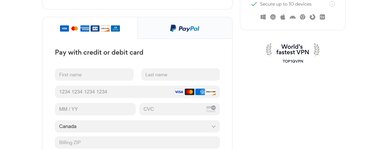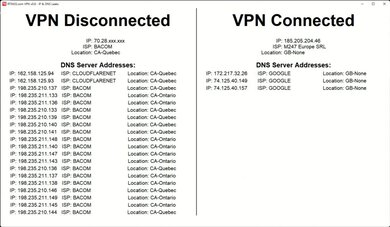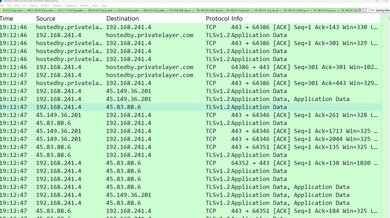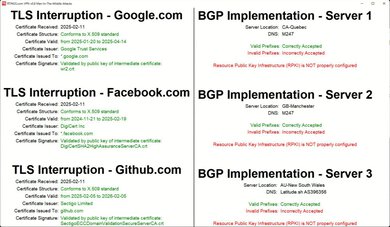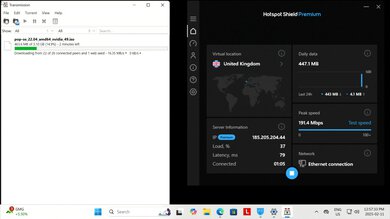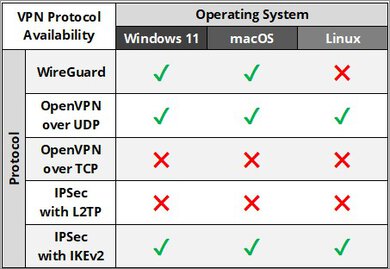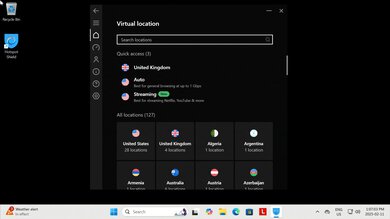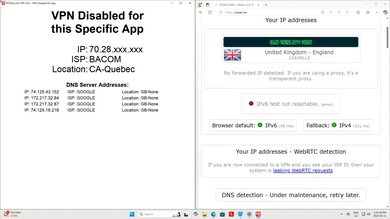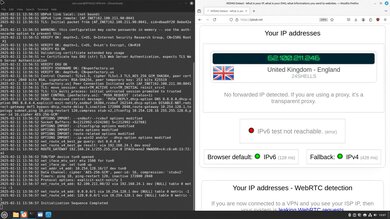Hotspot Shield is a VPN service founded in 2008 and owned by Point Wild, a US-based cybersecurity company that owns several other VPNs, including Betternet, UltraAV, VPN360, OVPN, and Total Security. It has applications on several different platforms, servers in over 80 countries, and features like Tor over VPN and obfuscation.
Hotspot Shield offers both a free and a paid version, and we tested both. See more in the Differences Between Variants section.
Our Verdict
Hotspot Shield is good for torrenting. It allows you to download P2P files and doesn't have a data limit. Its security is generally acceptable, as it keeps your IP address and DNS queries within its tunnel while you use it. However, its kill switch doesn't work properly, as it allows some unencrypted traffic to leak past the VPN in the event of a software crash or system reboot. It also doesn't support any anonymity-preserving payment options, and you have to sign up with an email address and password that can be linked to you in the event of a data breach.
-
Doesn't leak your IP address or DNS queries.
-
Proper TLS implementation protects you from man-in-the-middle attacks.
-
Kill switch leaks unencrypted traffic after system reboot and software crash.
-
No anonymous registration or payment options.
Hotspot Shield has acceptable security. It doesn't leak your IP address or DNS queries while you're connected, and it has proper TLS implementation, protecting you from man-in-the-middle attacks. Unfortunately, its kill switch doesn't work as intended, as it leaks some unencrypted traffic upon restarting your system or after a software crash. This is a concern if you need all your traffic to be encrypted after a crash.
-
Doesn't leak your IP address or DNS queries.
-
Proper TLS implementation protects you from man-in-the-middle attacks.
-
Kill switch leaks unencrypted traffic after system reboot and software crash.
Hotspot Shield delivers decent speeds overall that are suitable for general use. That said, its download and upload speeds only achieve around 100Mbps on average, so you can't take advantage of a faster internet connection if you have one.
Changelog
Check Price
Differences Between Sizes And Variants
Hotspot Shield has a free tier and a paid tier, which we bought and tested in this review. We also tested Hotspot Shield Free separately.
| Plan | Advertised Maximum Devices | Platforms | Protocol Support | Country Selection | Advertised Speed Throttling | Ads |
|---|---|---|---|---|---|---|
| Free | 1* | Windows, macOS, iOS, Android, Chrome | Hydra, Wireguard, IPSec (macOS only) | 3 | Yes** | Mobile |
| Premium | 10 | Windows, macOS, iOS, Android, Chrome, Linux, Smart TV, Routers | Hydra, Wireguard, IPSec, OpenVPN (manual configuration only) | 85 | No | No |
*While the free version advertises a limit of one device at a time, we could connect 11 devices simultaneously.
**Hotspot Shield advertises that the free version throttles speeds, but we didn't measure any significant throttling. See here to compare speed results between the two.
Compared To Other VPNs
Hotspot Shield is on par with most VPN services if you're looking to torrent files and get around some geo-restrictions, but like most other VPNs we've tested, it fails the kill switch test. That could be an issue if you're concerned with keeping your traffic protected at all times, like after restarting your system.
The community generally doesn't look particularly favorably on Hotspot Shield for their privacy record and somewhat opaque business practices. Their parent company owns several other VPN companies and even a VPN review site. If that's a concern for you, check out other VPNs we've tested, like Mullvad or IVPN. However, keep in mind that we can't verify privacy claims. Check out our article about VPN privacy for more details.
To see which services we recommend, check out our article on the best VPNs.
Test Results
The kill switch doesn't work properly, as network traffic leaks outside the VPN tunnel after a reboot and after a software crash. This is problematic if you're concerned with keeping your traffic encrypted when reconnecting to the internet after a reboot or crash.
This VPN's download speeds achieve ~100Mbps on average, so they're suitable for browsing and streaming video. However, if you have a much faster internet connection, you may have to wait longer for downloads.
This VPN's upload speeds achieve ~100Mbps on average, which is suitable for regular internet use, like video calls and uploading files relatively quickly. That said, it can bottleneck a faster internet connection.
This VPN has decent latency and is suitable for normal internet usage. However, its latency occasionally spikes, so you might experience some inconsistency during latency-sensitive tasks.
This VPN supports Ubuntu, Debian, and Fedora OS on Linux. You can also configure an OpenVPN connection manually.
It's additionally available on Android, iOS, Chrome, and smart TVs.
This VPN's proprietary protocol, Hydra, is closed source, and Hotspot Shield doesn't publish many details about it other than that they base it on OpenVPN.
You can only use OpenVPN if you configure it manually.
Comments
Hotspot Shield: Main Discussion
Let us know why you want us to review the product here, or encourage others to vote for this product.
The full review has been posted here. Let us know what you think!


